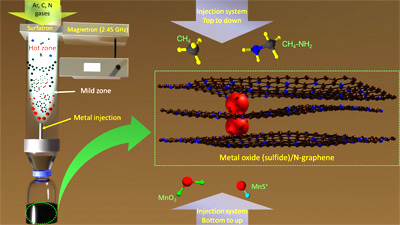The colleagues from Department for Gaseous Electronics of JOžef Stefan Institute and their partners within the H2020 FET-Open project “Pegasus” developed and demonstrated a novel and green approach in process engineering of graphene nanostructures used for green systems in energy storage. The researchers report one of the fastest methods for synthesizing nitrogen-doped graphene and incorporating metal oxide /sulfide nanoparticles into graphene layers simultaneously using a microwave plasma system. The authors revealed that produced graphene hybrids have higher quality and low production costs than commercially available graphene. The production method does not involve any complex chemical treatments and is an environmentally benign process. The reported plasma-driven environmental-benign approach could open many opportunities for different applications, especially for next-generation energy materials. The scientific article N-Graphene-Metal-oxide(sulfide) Hybrid Nanostructures: Single-Step Plasma-Enabled Approach for Energy Storage Applications was published in Chemical Engineering Journal, whereas the process was protected.

